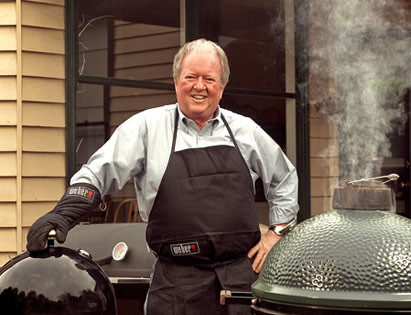Bob Hart’s recipe for beef ribs on the grill

A question I have often been asked is whether or not it is possible to slow-
cook – braise, perhaps – serious chunks of meat like, say, chunky beef ribs
on a gas barbecue. And the answer? No problem…
Pick up 2kg of beef ribs – short ribs, perhaps, or a couple of those stonking
great whole ribs, each knocked into three. Any serious butcher will have or will
obtain these for you and, if not, change butchers. Do not expect to find them
in a supermarket which, in my view, is no place from which to source serious
meat, anyway.
Sprinkle the ribs generously with sea salt and my all-purpose dry rub from any
of my books, or your favourite dry rub, and place them in a large. resealable
plastic bag. Refrigerate overnight, or longer if you like.
Now, fire up a gas grill or a kamado and prepare some braising liquid in a grill-
friendly baking dish or, my preference, a large Le Creuset pan by combining
two small bottles of wheat beer, 1 1/2 cups of water, 2 tbs raw sugar, two
flattened (but unpeeled) garlic cloves and several sprigs of fresh thyme.
Lightly oil (with EV olive oil) the ribs and return them to room temperature.
Also, slice three red onions into thick (1.5cm) rounds, then spike each round
with a metal skewer to hold the rings together. Oil and season.
Clean and lightly oil the grill which should be reading at least 220C, or even a
touch higher. Place the ribs and the onions on it. Cook them, moving them
through 90 degrees after three minutes on the first side, and cook for a total of
six minutes a side – covered, of course.
Remove the onions and add to the braising liquid at this stage and continue to sear the ribs until they are
comprehensively charred. Depending on the power of your grill, you may
need to reduce the heat slightly while doing this, but keep the temperature
fairly high. Actual cremation, however, as in life, should be avoided.
Now lift the grill-marked, caramelised ribs off the grill and place in the pan with
the braising liquid and onions. Cover with foil and place on the grill, reducing
all burners to low and turning off the burner under the pan completely once a
temperature of around 160 C has been reached in the barbecue.
Or, alternatively, by placing a heat deflector in position if you are using a
kamado.
Cook, covered of course, for around 2 hours, or until the ribs are becoming
tender.
Remove the foil and continue to cook the ribs, barbecue lid down of course,
until they are further caramelised and meltingly tender when you test them
with a long, thin fork, and the sauce has reduced and thickened. If more liquid
is required at any stage, simply add water. Do not let the pan boil dry.
Lift the cooked ribs and onions from the tray with a perforated spoon and
place on a warm serving dish. Tent with foil. Strain the sauce, ideally into a fat
separating jug if you have one, or into a bowl and allow to settle before
skimming off the fat.
Use the thick liquid remaining as a sauce for the ribs, which are best served
on steamed rice, with mash, or simply with boiled spuds. Be amazed.















